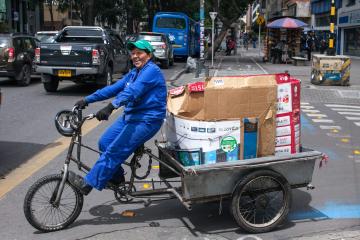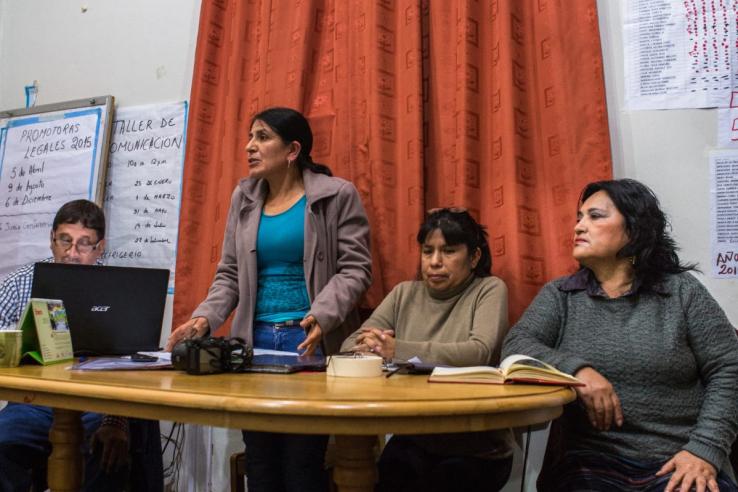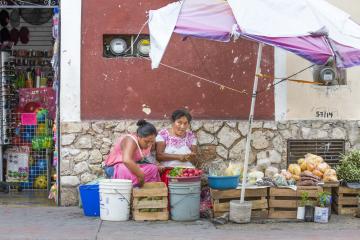
Developing capacities for the generation and use of evidence in the promotion of women's agency in Central America

Organizations in Central America increasingly recognize the importance of improving women’s agency by implementing programs and initiatives to support this goal. However, the lack of evidence on the effectiveness of the interventions, as well as when and why they work makes it challenging to strengthen policies that meaningfully improve women’s lives.
Policymakers and the private sector can benefit not only from training and education on how to use and generate rigorous evidence while evaluating their programs, but also from applying insights from effective strategies that have been used elsewhere to address similar challenges to ultimately support women’s agency and address restrictive gender norms.
As part of J-PAL Latin America and the Caribbean’s (LAC) efforts to strengthen capacities and share evidence, in January 2023, we started the project Capacity Building and Outreach for Gender Agency in Central America with the generous support of the Cotopaxi Foundation.
The project prioritizes two short-run objectives: (1) strengthen local capacities on evaluation and evidence use through online training, and (2) share the importance of evidence-informed policymaking as well as evidence on programs and policies that have been effective at enhancing women and girls agency.
Context: Women in Central America
In Central America, like in most of the world, countries, participation rates of women in the labor force are lower than those of men. This translates to countless missed opportunities for women to gain income, empowerment, and economic agency. In addition, women in the region tend to face higher unemployment rates than men—especially women between the ages of 15 and 24—, and have lower salaries, particularly in Guatemala and Nicaragua. In Nicaragua, Guatemala, and Honduras, women have very limited participation in the agricultural sector in comparison with other parts of the world, generating even more pronounced gender gaps in rural areas.
Although fertility rates have dropped in the last decade in all of Central America (mainly for those who are 15 to 19 years old), demographic structures differ between countries: the population under 20 years old is 28 percent in Costa Rica, 35 percent in Panamá and El Salvador, and over 40 percent in Guatemala, Nicaragua, and Honduras. Given that domestic care responsibilities tend to fall on women, the absence of care alternatives imposes difficulties to opt for paid work outside the home. The proportion of 15 to 24 year old women that are not in education, employment, or training in Guatemala, Honduras, and El Salvador is more than 40 percent (compared to 12 percent for men). This proportion outnumbers the average for the world’s low-income countries: 35 percent.
Since labor is the main source of income for households around the world, barriers to generating paid opportunities are closely related to poverty. Besides labor and income, there are other dimensions related to gender empowerment—like participation in political and intrahousehold decisions—that are important to consider when promoting interventions to enhance women´s agency.
Importance of programs and interventions to encourage effective women's agency impact
Women's agency is ultimately about empowering women and girls to set and achieve goals, make important decisions, and be active economic and civic participants in their communities.
Research findings from low- and middle-income countries about the effectiveness of programs and policies that cut across multiple domains of women's lives provide insights that can improve the agency of women. These lessons—which can be applied to and shared within Central America—touch the economic, political, and cultural dimensions. Examples include lessons from programs that help adolescent girls work on soft skills and life skills; laws that safeguard women’s property rights, remove any labor restrictions, and support female political representation; cash and in-kind transfer programs to empower women and protect them from domestic violence; and interventions that provide entrepreneurial training.
When designing a program it is important to keep in mind that the process of enhancing women’s agency is also shaped by and interacts with the local norms and institutions (cultural, social, political, and economic) that define their possibilities in the given context. These institutionalized “structures of constraint” shape the choices available to women and girls at every step of the process, therefore, policymakers might need to adapt the programs to the local contexts and answer new research questions.
J-PAL-LAC efforts in the area of gender
The project Capacity Building and Outreach for Gender Agency in Central America is part of an ensemble of efforts J-PAL is carrying out in Latin America to promote gender equity. These activities include financing the impact evaluation of programs and public policies through the Gender and Economic Agency (GEA) Initiative, launching a Spanish-language version of J-PAL’s Practical Guide for Measuring Women’s and Girls’ Empowerment tailored to the LAC region, delivering training to public officers in Mexico, and hosting evidence-sharing events.
What’s next?
While conducting the activities we just mentioned, we have realized that organizations working for gender equity in Central America could benefit from training and additional outreach events. Randomized evaluations can provide important lessons about design features and help us understand the process of women’s empowerment itself. However, it can be challenging to design a measurement strategy that accurately captures empowerment changes, is tailored to the local context and minimizes measurement bias. As a result, we decided to reinforce our efforts in the region by offering:
- A four-session synchronic online training. We will offer an online introductory training that will cover randomized evaluations and evidence use. The training will take place in May, is free of charge, and will be held in Spanish. The number of participants is limited and applicants must be working in Central America in organizations related to social programs and gender perspective.
- In-person gatherings for discussing the importance of evidence and presenting results from randomized evaluations. The gatherings will take place in different countries during the first semester of 2023.
- A webinar for sharing evidence on women’s agency relevant to Central America. The webinar will take place in May, is free of charge, and will be held in Spanish.
We are looking forward to working together with policymakers, NGOs, and public and private organizations based in Central America working to enhance women's and girls' empowerment. You can learn more by registering to our newsletter to receive more information aboute the upcoming training, webinar, and in-person events, or by writing to [email protected].
Related Content
Importancia de la evidencia para el diseño y mejora de programas que favorecen la agencia de las mujeres

Gender and Economic Agency Initiative increases funding to Latin America and South Asia with third funding round

